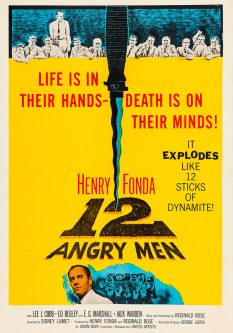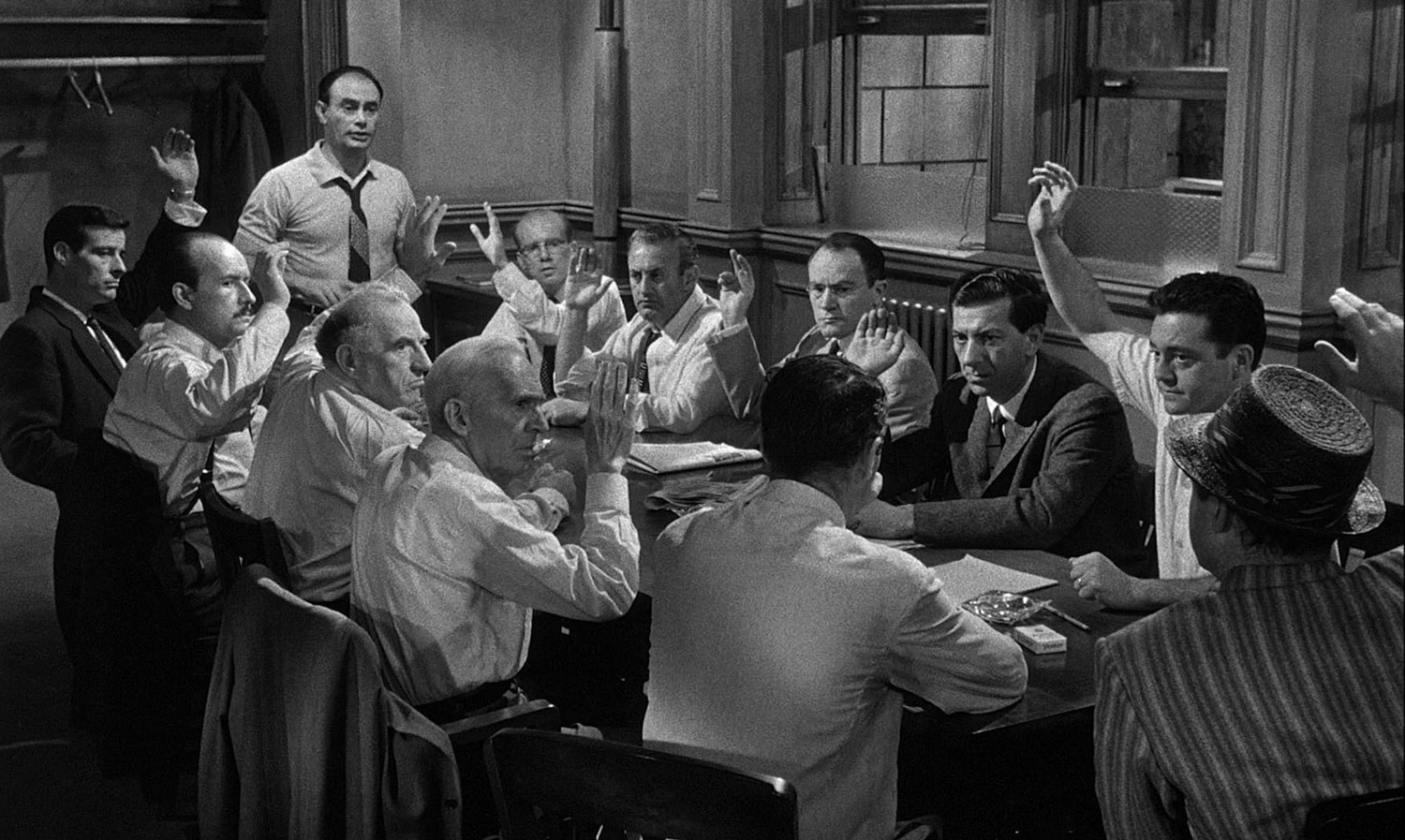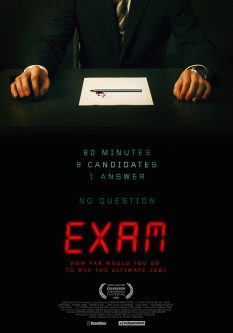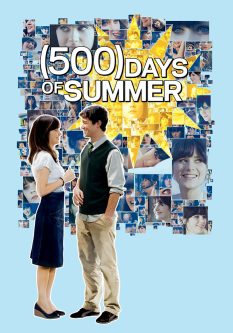
Director: Sidney Lumet
Wrtier: Reginald Rose, Reginald Rose,
Stars: Martin Balsam John Fiedler Lee J. Cobb
Summary: The jury in a New York City murder trial is frustrated by a single member whose skeptical caution forces them to more carefully consider the evidence before jumping to a hasty verdict.
The film 12 Angry Men by Sidney Lumet shows us a difficult but possible path to search for the truth. Is it possible to make a film in a single location and with 12 characters, where the variety of mise-en-scène and composition can make the audience forget being limited to one space? Is it possible to narrate a story so important and involving that by gradual disclosure of information, only through dialogue, to attract the audience until the end of the film?

Is it possible for individuals from different generations and different social classes to sit at the same table and discuss despite their many differences of opinion? In addition, can we hope for a conclusion? Sidney Lumet, both by his directorial arrangements and his main character’s language (played by Henry Fonda), keeps telling us that it is possible. 12 Angry Men is about possibilities that despite being exhausting and difficult are valuable to realize. A low-angle shot exhibits the grandeur of the courthouse while introducing the location and the next shot from above shows the smallness or captivity of those inside. This is Lumet’s initial introduction to the main location, where many fates take place in each room, destinies that are formed based on a judgment.

This place seems important and grand at the beginning; however, it is as if the people who are called to this place do not understand the significance of what is happening inside, like those who came to the court as a jury. Where, in a division in the frame, the boy accused of murder is on the left and the 12 members of the jury are on the right, such a way that the fate of this accused is well connected to the room in which these people are going to judge. With this frame and the judge’s brief dialogue about the decisiveness of the jury’s verdict, we understand the importance of this issue at the very beginning of the story.
A person’s life is also a universal and archetypal issue that gradually involves all. 12 men enter a room where the heat of premature judgment and misguidance has troubled them from the very beginning. They spread in the room and everyone kind of represents himself by the behavior they show at the beginning. One thinks of his baseball game and sits restfully on the table instead of the chair. Another is busy reading newspaper ads. It is just as if the behavior that each of them shows in the first place, leads us to a kind of judgment. Since each of us as the thirteenth person in this room, is ready to gently disclose the information in the script, put together the puzzles of this case and determine whether this accused is guilty or innocent. Now let us check what arrangements Lumet has prepared for the introduction of these 12 people.

When they first enter the room, 10 of 12 of them are moving on stage and doing something. One of them, who later becomes Henry Fonda’s first supporter and plays a significant role in the progress of the story, is absent so his separate entry will give more emphasis. Finally, Henry Fonda himself, standing motionless and separate in a white dress, in the corner of the background frame is introduced to us as the main character. From the window, it is as if he is staring at a distant truth and is looking for a way to prove his ideas.
They should spend most of the movie sitting around a table and discussing. Sitting around the table is a contradictory feeling. Both on the surface, it represents a kind of unity, and on the other hand, it represents the differences of opinion of people around it. On the other hand, each of these people getting up from the table is both an expression of disagreement and escaping from a logical discussion, and it serves to diversify the mise-en-scene and achieve new compositions with the camera whose contract is to move from one subject to another. Lumet’s camera also constantly moves around the table to introduce new frames with a variety of people around the table.

He does not know whether the accused is guilty or innocent but only wants to be responsible and do his best to find the truth. This belief paves the way for others who want to accompany him. Interestingly, not all the mysteries of the film are solved by Henry Fonda; for example, the speculation that it is not possible for one of the witnesses to run or that the other witness is wearing glasses is expressed by two other men, which plays a significant role in clarifying the truth. Fonda’s most important job was not to give in to the 11 votes against him at the beginning and to continue his path determinedly. His reward is finding supporters who will help him in complete victory. This is where the movie problem can be generalized for any similar path.

In the course of the script, a weakness is planned for each of the characters, which has several functions. In the first place, it discriminates each of these 12 people well in our minds. Later, this weakness becomes a strong reason for changing the opinion of each of the characters; since one of the most sensitive events in the script is the moment when someone’s opinion changes. For example, one’s weakness is that he grew up in a neighborhood similar to the accused and identifies with him from one point on.
Another character’s weakness is that, without putting himself in the place of the accused, he denounces his poor memory in remembering the name of a movie. The most fundamental weakness is that of a father who has a son of the same generation as the accused and treats this case as a personal settlement. To describe the challenge of this script, it is enough to say that if in the classic script, we often saw the main character change, here we see the change of 12 characters. 11 people change their minds and the main hero steps more ambitiously on his path.

Rather, in case we take a deeper look into the concepts of the script, as if gathering 12 people around a table to judge a defendant, is probably a tool to express how one person who has realized the light of the truth can align 11 others with himself. Lining up 11 opposites in the first place seems difficult enough to make any audience determined to prove their accurate judgment if it ends up being possible. Even if the path to proof as depicted in the film is much more difficult than one can imagine, the film makes some promising points. Henry Fonda is a character who only says that there should be a little more discussion for such an important issue.
Oh, indeed, the feeling of liberation at the end of the film is delightful. The rain has washed away all confusion and ambiguity. One by one, the jurors walk out of the courthouse having become better humans. Additionally, we are liberated from the burden of a challenging judgment. Henry Fonda’s handshake with his first old patron resembles the handshake of two generations. It is interesting that it was the older people who trusted the younger ones and ultimately accepted their proof. The pattern followed in the room of 12 angry men should be investigated repeatedly, it might be used in many battles … or it might be said that this movie is a work that can make the world a better place …
12 angry men ending explained:
When the amiable Jurors 8 (Mr. Davis) and 9 (Mr. McCardle) switch names at the conclusion of the movie, all of the jurors depart the courthouse steps to return to their separate lives, never to cross paths again.
Is 12 Angry Men a good movie?
The lively conversation, realistic environment, and, of course, the superb cast of exceptional character performers hold the key. This film is a masterwork. This film is among the best, despite the fact that the phrase is frequently used because it is so simple to say about outstanding movies like this.
What is the main point of 12 Angry Men?
It all depends on whether or not the jury believes he’s guilty. Although many Americans have had trouble accepting it, the idea of reasonable doubt, which holds that a defendant is innocent until proven guilty, is one of our Constitution’s most progressive provisions.
Why is 12 Angry Men so highly rated?
It’s one of the most ideal examples of how lovely a movie can be if it focuses on plot, character, and conflict, so the answer is actually fairly simple. The plot is straightforward: a young man is charged with killing his father, and the jury’s twelve anonymous members must determine whether or not to convict him.
Why are there no female jurors in 12 Angry Men?
The Civil Rights Act of 1957 granted women the opportunity to serve on federal juries, and the movie was released in 1957, the same year. All of the jurors are men because the play was created in 1954 and the setting of New York did not permit women on federal juries until 1968.
Why is Juror 8 a hero?
Answer and Justification: Juror 8 is a hero in the movie 12 Angry Men because he defends the legal system’s goal of establishing a reasonable doubt rather than the defendant’s guilt or innocence. He does not allow his own bias or prejudice to cloud his judgment, which elevates him to the position of moral authority during the jury’s deliberations.
Why is Juror 3 angry?
Evidently, juror number three had some misgivings about the generation that his son belonged to. After coming to the conclusion that his ire toward the defendant was a direct result of his strained relationship with his son, juror number three changed his vote.
Why did Juror 12 vote not guilty?
Why did Juror 12 in 12 Angry Men change his verdict to not guilty? When presented with evidence that suggests the defendant’s memory is incorrect and that the defendant would not have stabbed his father in the manner in which his father was stabbed, juror number 12 alters his vote from guilty to not guilty.





Leave a Reply